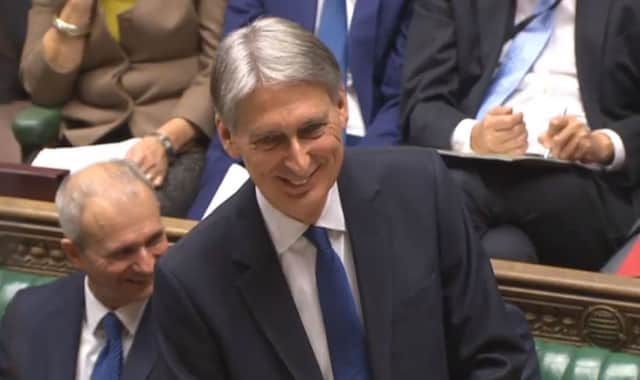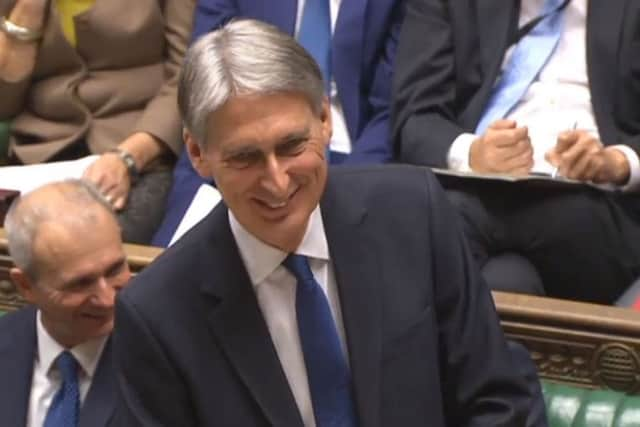Autumn Statement: Hammond announces £800m boost for Scotland


The Chancellor said the cash would be allocated to the Scottish Government over the five years through to 2020-21, as a result of increased infrastructure spending announced in the Autumn Statement.
But his SNP opponents argued that the money did not make up for the cuts coming Scotland’s way as a result of the UK government’s austerity agenda.
Advertisement
Hide AdAdvertisement
Hide AdThe extra cash will come to Scotland as a result of Mr Hammond’s new National Productivity Investment Fund of £23 billion, which he said would be spent on innovation and infrastructure over next five years.


Of that £23bn total, Scotland will receive more than £800 million as a result of the Barnett Formula, the mechanism which determines how much cash Scotland receives from the Treasury.
The Scottish Government will decide how the money is allocated. Unveiling his Autumn Statement, Mr Hammond said he hoped the cash would be invested in raising the productivity performance of the Scottish economy.
During an exchange with the Dundee East SNP MP Stewart Hosie, the Chancellor also warned against holding a second Scottish independence referendum.
Addressing Mr Hosie, the Chancellor said: “He knows this very well – he probably wouldn’t admit it, but he knows it very well – the biggest drag on growth in Scotland, survey after survey shows, the biggest drag on business investment is the continuing threat of a second referendum. Bigger than concerns about possible future Brexit arrangements is the concern about a second Scottish independence referendum.”


Forecasts produced by the Office for Budget Responsibility (OBR) showed that UK oil and gas revenue would be minus £500m in 2016-17. The OBR’s prediction that oil and gas would go into the red came despite the forecast being revised up by £500m since the March Budget.
The OBR said the figures would move back into the black in 2017-18 when revenue increases to £0.9bn with £1.8bn forecast for 2019-20.
Advertisement
Hide AdAdvertisement
Hide AdScottish Labour leader Kezia Dugdale said the UK government should have done more to revive the North Sea oil and gas industry.
She said: “This Autumn Statement was more of the same old Tory mantra – cut, cut and cut again. The Chancellor could have announced an end to the austerity which is damaging our public services and holding back working families. He could also have announced major new investment in the North Sea oil and gas industry to protect jobs and the local economy.”
Scottish Finance Secretary Derek Mackay insisted the additional cash would only moderate cuts that are coming to the Scottish Government’s budget.
He said: “Under these plans, Scotland will see a real terms cut to the day-to-day budget that pays for public services. By 2019-20 it is expected to be almost 9 per cent lower over the decade, reducing the scope we have to mitigate against Westminster austerity and invest in growing our economy.
“Even on the much-heralded investment in infrastructure, all we have seen is the Chancellor moderating cuts already imposed on Scotland. As a result, Scotland’s capital budget will still be around 8 per cent lower in real terms across this decade.”
The Chancellor’s package for Scotland also included £3m from Libor banking fines to go to the Aberdeen Remembrance Hall, the Children’s Hospice Association Scotland, the Glen Art Bravehound Project, Poppy Scotland, and the Wheatley Foundation, which helps veterans with housing support.
Mr Hammond also pledged to work with the Scottish Government towards a City Deal for Stirling. He also confirmed for City Deals in Aberdeen and Inverness, continuing negotiations for Edinburgh and examining proposals for Tay cities Dundee and Perth.
Scottish Secretary David Mundell said: “Most significantly for Scotland is the £800m of extra capital funding … it is for the Scottish Government to step up now.”
KEY POINTS
Advertisement
Hide AdAdvertisement
Hide Ad• Chancellor Philip Hammond said the Office for Budget Responsibility (OBR) has slashed the GDP growth forecast for 2017 from 2.2% to 1.4%, as well as forecasting growth of 1.7% in 2018, 2.1% in 2019 and 2020 and 2% in 2021. The OBR’s view is that the EU referendum result means potential growth over the period is 2.4 percentage points lower.
• Mr Hammond confirmed he is abandoning predecessor George Osborne’s aim of achieving a budget surplus by 2019/20, saying he is committed to returning public finances to balance “as soon as practicable”.
• Public spending this year to be 40% of GDP - down from 45% in 2010.
• Borrowing is forecast by the OBR to reach £68.2 billion this year then £59 billion in 2017/18, then £46.5 billion, £21.9 billion, £20.7 billion in subsequent years, reaching £17.2 billion in 2021/22.
• The £3.5 billion of efficiency savings announced at the Budget to be delivered in full.
• Corporation Tax cut as planned to 17%, which Mr Hammond said is “by far the lowest” of G20 nations.
• A £2.3 billion Housing Infrastructure Fund to deliver infrastructure for up to 100,000 new homes in high demand areas and £1.4 billion made available to deliver 40,000 additional affordable homes.
• Investment of more than £1 billion in digital infrastructure and 100% business rates relief on new fibre infrastructure to make UK “a world leader” in 5G.
Advertisement
Hide AdAdvertisement
Hide Ad• Income tax free personal allowance to rise to £12,500 and the higher rate threshold will increase to £50,000 by the end of the Parliament.
• The National Living Wage will rise from £7.20 to £7.50 in April 2017.
• Universal credit taper rate to be cut from 65% to 63% from April at a cost of £700 million.
• The Autumn Statement has been abolished and the main budget statement will move from the spring to the autumn.